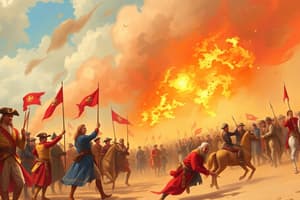Podcast
Questions and Answers
What was a key focus of the Enlightenment movement?
What was a key focus of the Enlightenment movement?
- Promotion of reason and individualism (correct)
- Support for supernatural occurrences
- Emphasis on tradition and authority
- Advocacy for absolute monarchy
What is the primary characteristic of enlightened absolutism?
What is the primary characteristic of enlightened absolutism?
- Legal and social reforms by absolute monarchs (correct)
- Total rejection of monarchy
- Disruption of the existing social order
- Empowerment of the church
Which reform was introduced by Joseph II during his reign?
Which reform was introduced by Joseph II during his reign?
- Abolition of the monarchy
- Introduction of taxes for nobles (correct)
- Return to Latin as the educational language
- Increased serfdom
What was Josephinism mainly focused on?
What was Josephinism mainly focused on?
What event inspired crowds in Vienna to protest for basic freedoms on 13 March 1848?
What event inspired crowds in Vienna to protest for basic freedoms on 13 March 1848?
How did Maria Theresia and Joseph II attempt to reform education?
How did Maria Theresia and Joseph II attempt to reform education?
What was the initial response of the Austrian government to the protests in March 1848?
What was the initial response of the Austrian government to the protests in March 1848?
Which reform was NOT attributed to the leadership of Maria Theresia and Joseph II?
Which reform was NOT attributed to the leadership of Maria Theresia and Joseph II?
What significant legislative achievement emerged from the unrest in Austria during 1848?
What significant legislative achievement emerged from the unrest in Austria during 1848?
What was one of the goals of Enlightenment thinkers?
What was one of the goals of Enlightenment thinkers?
What happened to the constitution issued by Emperor Ferdinand I in April 1848 when the legislature met in June?
What happened to the constitution issued by Emperor Ferdinand I in April 1848 when the legislature met in June?
What was a consequence of the reforms pursued by Maria Theresia?
What was a consequence of the reforms pursued by Maria Theresia?
What was the outcome of the Habsburgs' efforts to counter the revolution in October 1848?
What was the outcome of the Habsburgs' efforts to counter the revolution in October 1848?
How did the revolutions of 1848 affect ethnic groups within the Habsburg monarchy?
How did the revolutions of 1848 affect ethnic groups within the Habsburg monarchy?
What was one of the key demands of the Hungarian nobility since 1815?
What was one of the key demands of the Hungarian nobility since 1815?
What constitutional governance outcome did the legislature face after moving to another city?
What constitutional governance outcome did the legislature face after moving to another city?
What was one of the main features of neo-absolutism's domestic agenda?
What was one of the main features of neo-absolutism's domestic agenda?
Which of the following was NOT a feature of the December Constitution of 1867?
Which of the following was NOT a feature of the December Constitution of 1867?
What key provision ensured full Jewish emancipation in Austria?
What key provision ensured full Jewish emancipation in Austria?
What led to the stabilization of Austrian finances in October 1922?
What led to the stabilization of Austrian finances in October 1922?
What replaced the feudal arrangements during neo-absolutism?
What replaced the feudal arrangements during neo-absolutism?
What significant judicial reform was established by the Basic Law of the Judiciary?
What significant judicial reform was established by the Basic Law of the Judiciary?
What was a significant outcome of Chancellor Ignaz Seipel's actions in 1922?
What was a significant outcome of Chancellor Ignaz Seipel's actions in 1922?
What was a reason for the lack of confidence among neo-absolutist leaders regarding taxation?
What was a reason for the lack of confidence among neo-absolutist leaders regarding taxation?
Which aspect was NOT included in Woodrow Wilson's Fourteen Points?
Which aspect was NOT included in Woodrow Wilson's Fourteen Points?
Which of the following was a primary goal of the League of Nations as envisioned in the Fourteen Points?
Which of the following was a primary goal of the League of Nations as envisioned in the Fourteen Points?
What was one of the financial changes that occurred during neo-absolutism?
What was one of the financial changes that occurred during neo-absolutism?
When were serious crimes required to have a trial by jury according to the judiciary reforms?
When were serious crimes required to have a trial by jury according to the judiciary reforms?
What challenge did Austria face between 1919 and 1921 despite improved production?
What challenge did Austria face between 1919 and 1921 despite improved production?
What type of reconstruction program was implemented in socialist-controlled Vienna?
What type of reconstruction program was implemented in socialist-controlled Vienna?
What was a focus of the peace treaties of Versailles and St. Germain?
What was a focus of the peace treaties of Versailles and St. Germain?
What did financial supervision in Austria achieve by March 1926?
What did financial supervision in Austria achieve by March 1926?
What action did Franz II take in 1804 to protect Habsburg interests?
What action did Franz II take in 1804 to protect Habsburg interests?
What was the significance of Franz II renouncing the title of Holy Roman Emperor in 1806?
What was the significance of Franz II renouncing the title of Holy Roman Emperor in 1806?
What event prompted Franz II to declare himself as Francis I of Austria in 1804?
What event prompted Franz II to declare himself as Francis I of Austria in 1804?
What was one consequence of the French Revolution that contributed to the fall of the Holy Roman Empire?
What was one consequence of the French Revolution that contributed to the fall of the Holy Roman Empire?
What did the title of Emperor of Austria signify for the Habsburgs?
What did the title of Emperor of Austria signify for the Habsburgs?
What was a major strategic move by Franz I regarding France after the 1809 defeat?
What was a major strategic move by Franz I regarding France after the 1809 defeat?
How was the adoption of the title 'Emperor of Austria' viewed in terms of legality?
How was the adoption of the title 'Emperor of Austria' viewed in terms of legality?
What was one of the main aspects leading to the decline of the Holy Roman Empire by the early 19th century?
What was one of the main aspects leading to the decline of the Holy Roman Empire by the early 19th century?
Flashcards are hidden until you start studying
Study Notes
Enlightenment Ideas
- Intellectual movement of the late 17th to 18th century emphasizing reason, individualism, and skepticism.
- Promoted humanism, equality, and dignity, opposing superstition and bigotry.
- Goals included knowledge, freedom, and happiness, with a belief in the power of human reasoning to uncover truths.
- Influence on religious thought led to the emergence of Deism.
- Resulted in significant developments in art, philosophy, and politics.
Enlightened Absolutism
- Government form where absolute monarchs implemented Enlightenment-inspired reforms in the 18th century.
- Notable figures included Maria Theresia and Joseph II of Austria.
- Focused on administrative reform, religious tolerance, and economic development while maintaining monarchal sovereignty.
Major Reforms by Maria Theresia and Joseph II
- Military: Increased army size and established a military academy.
- Financial: Introduced taxes on nobles and implemented financial reforms to enhance state finances.
- Educational: Developed a new mandatory school system, shifting the language of instruction from Latin to German.
- Religion: Limited the power of the Church, integrating it with government.
- Medicine: Centralized medical care by constructing a large hospital in Vienna.
- Social: Joseph II notably abolished serfdom.
Josephinism
- Refers to the domestic policies of Joseph II during his reign (1780–1790).
- Aimed to transform Austria into an ideal Enlightened state as envisioned by liberal thinkers.
Establishment of the Empire of Austria
- In response to Napoleon's rise, Francis II adopted the hereditary title of Emperor of Austria in 1804.
- Marked a shift from the Holy Roman Empire, admitting defeat and challenging Habsburg authority.
- The title of Emperor of Austria encompassed all lands under Habsburg rule, lacking strong legal grounding.
Fall of the Holy Roman Empire
- Majorly influenced by the outcomes of the French Revolution.
- By the 16th century, the empire had become a loose federation.
- Public protests in Vienna in 1848 called for freedoms and government liberalization.
- The Habsburg government, after initial suppression, moved towards implementing constitutional changes.
1848 Revolution Demands in Austria
- Initial response included a constitution established by Emperor Ferdinand I, which was later rejected for being less democratic.
- Despite the failure to create a functioning constitution, significant legislation like the liberation of the peasantry emerged.
- Ethnic nationalism, particularly within Hungary, prompted significant societal changes.
Neo-Absolutism Developments
- Came about after the 1848 revolutions, aiming to strengthen Habsburg prestige and power through rational governance.
- Established legal equality and abolished feudal tax privileges and noble rights.
- A German-speaking bureaucratic system replaced feudal structures, seeking economic stability but struggling with taxation.
December Constitution of 1867
- Established key principles including equality before the law, abolition of serfdom, and freedoms of press, religion, and assembly.
- Enhanced the judiciary's independence and ensured trial by jury for serious crimes.
- Promoted a central constitutional state with lasting influence on Austrian governance.
Woodrow Wilson's Fourteen Points
- Proposal for post-World War I peace aimed at preventing future conflicts.
- Advocated for open agreements, arms reductions, freedom of trade, and self-determination for oppressed minorities.
- Suggested the creation of an international organization to safeguard nations' independence and territorial integrity.
Peace Treaties of Versailles and St. Germain
- Aimed to establish a stable post-war order and recognize the independence of nations, particularly separating regions of Austria-Hungary such as Hungary and Czechoslovakia.
- Focused on territorial integrity and political autonomy for both large and small states.
Studying That Suits You
Use AI to generate personalized quizzes and flashcards to suit your learning preferences.





